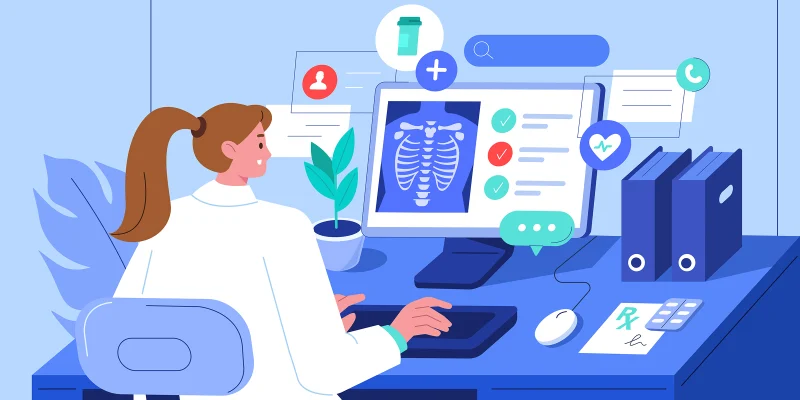Exponential growth of telemedicine in the last three years has forced medical oversight committees and commissions to develop definitions for the product and governance for those who practice under the telemedicine umbrella. This growth has left the medical governance commissions scrambling to keep up and forced them to come up with new laws that cover the clinicians and patients who would use this new system of health care. APPs are less costly than MDs or DOs, and with expansions to their telehealth allowances, many APPs found themselves practicing telemedicine over the pandemic.
It seems that telemedicine is the panacea for how to deliver health care with less risk to the patient and practitioner alike. I have learned that things that seem too good to be true often are just that. There are cautions and caveats to being a telemedicine clinician.
Though there are pros to telemedicine, there are definitely cons: Access is limited to patients who can afford computer service and broadband Wi-Fi; telemedicine is a less than optimal environment for the best medical care; it is still not as good as face-to-face, in-person care; and the practitioner is exclusively responsible for any substandard care or poor outcomes as a result of using telehealth medicine. In the state of Washington, HB 1196 instituted that it is the clinician’s responsibility to maintain records on all of the patients under their care — and not being able to produce these records can cost a clinician his or her license. APPs are in a unique position to benefit from this new influx in jobs and to be on the cutting edge of a new form of health care delivery, but it is imperative to proceed with caution and make sure you are protected in your venture into this new frontier.
For example, before you begin practicing, research and know the telemedicine laws and regulations in your state — very well. Knowing the standards and practices you must meet to avoid losing your license or putting your patients at risk is vital to your performance as a telehealth clinician. If you are signing on with a company, you should know if they are aware of the regulations for practice in your state and how they are supporting your ability to meet those qualifications and requirements.
Make sure to also establish a strong support system of specialists and like-minded clinicians. In the care of telemedicine patients, it is often necessary to err on the side of caution, to avoid any complications from remote care. Having a few medical care specialists in your “rolodex”’ who you can rely on for availability is a great idea. Ob/gyns, orthopaedic specialists, and EM specialists who are available for you to consult with (and who can fit your patients in if needed) are important for good telemedicine care.
And as you care for patients, make sure you have a secure way of maintaining medical records. Large facilities will already have a system in place: MyChart, etc., but a smaller company must have a secure way of storing medical records that allows you to access them whenever you need them. It never hurts to have a backup system in place. There are secure medical record apps you can purchase to ensure your patients’ records are stored and available for you to access them.
Tied to patient security is patient safety. In telemedicine, as with all health care, safety should be at the forefront of your care plan. For this reason, you should have in mind a best and worst case scenario for every patient you see. Having an easily deployable “Plan B” for every patient will enable you to provide the best and safest medical care. Is there any possibility that the sore throat could be a peritonsillar abscess? That the sprained ankle could include a torn ligament or fracture? This is where your network of clinicians comes in. An easily deployable medical care plan for X-rays, emergency care, or emergent referrals should be established. It never hurts to establish good relations with other clinicians in your area, and most like getting cases thrown their way.
Make sure you are providing value in your health care. Listening is the most important part. Remember, they are paying for your medical expertise. Knowing what you don’t know and having a good knowledge base will go a long way toward making every telemedicine interaction beneficial for your patients. Getting the same information you would for an in-person encounter will help you to avoid pitfalls and practice mistakes that could be costly down the road. Give your patients the benefit of your experience and care, don’t just tell everyone to gargle or take an aspirin. It does not hurt to have a low threshold for sending patients for an in-person consult, but knee-jerk referrals give the impression you don’t know what you are doing and will destroy patient satisfaction with your care.
Telemedicine allows you the freedom to set your own schedule and also have the satisfaction of performing quality medical care that helps your community and enhances the health of those in it. Telemedicine is a great step in the right direction for health care, if used correctly and with caution, and has a role in the future of practice for APPs. But be sure to exercise a little caution and do some investigation before accepting a contract, as knowing the pitfalls will help you to avoid them. As long as you approach offers with eyes wide open and don’t let a high salary blind you to the most important aspects of the job, there is no reason that telemedicine can’t be the best job you have ever had.
What do you wish you would have known about telemedicine? Share your hindsight learnings in the comments.
Arlene Dorrough has been a practicing PA for more than 15 years. She is currently working in occupational medicine and urgent care. She is also working as a Medical Examiner for the DOT. Arlene is a 2021–2022 Doximity Op-Med Fellow.
Image by Alphavector / Shutterstock






